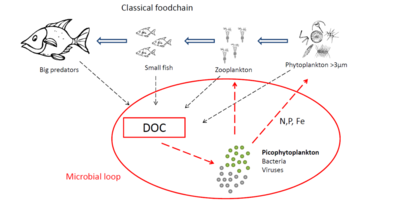Microbial loop
Definition of Microbial loop:
The trophic pathway through which dissolved organic carbon (DOC) released by marine organisms is returned to higher trophic levels via its incorporation into bacterial biomass grazed by phytoplankton.
This is the common definition for Microbial loop, other definitions can be discussed in the article
|

Phytoplankton and other marine organisms release organic molecules called Dissolved Organic Matter (DOM) or Dissolved Organic Carbon (DOC). DOM includes liquid wastes of zooplankton and cytoplasm that leaks out of phytoplankton cells. In the microbial loop, bacteria consume DOM that cannot be directly ingested by larger organisms. Each millilitre of seawater contains approximately 1 million bacterial cells, many of which utilise DOM as a source of energy and nutrition. Bacteria are eaten by microflagellates. The abundance of the bacteria is, to a large extent, regulated by the grazing effects of heterotrophic nano-flagellates (2 – 20 μm in diameter). Ciliates, which are small enough to eat microflagellates, are eaten by zooplankton. Micro-flagellates and ciliates help to recycle organic matter back into the marine food web. Bacteria also help to facilitate phytoplankton growth by releasing nutrients when they absorb DOM. Viruses are the smallest and most abundant organisms in the sea, viral activity produces DOM, thus helping to drive energy cycles for ocean life. The main difference of the microbial loop between estuarine and coastal waters is that coastal waters tend to have lower population densities of bacteria and of the organism that prey on them.
Related articles
References
- ↑ Stawiarski, B. and Buitenhuis, E. (2013) Picophytoplankton physiology and the microbial loop. eposter European Geosciences Union General Assembly, Vienna 2013